 “Hasn’t put a foot wrong” is a pretty sweeping statement to be sure. But I really think it applies to Season 3 of Golden Kamuy. What was already a very good show (I would have said barely shy of great) has leveled up in every way. The music, the animation, the backgrounds, the pacing, the main plot – it’s all flowered impressively. Virtually everyone involved is the same, but the end product is strikingly better. It’s rare to see a series that’s already this good improve this much, but the result is always glorious when it does.
“Hasn’t put a foot wrong” is a pretty sweeping statement to be sure. But I really think it applies to Season 3 of Golden Kamuy. What was already a very good show (I would have said barely shy of great) has leveled up in every way. The music, the animation, the backgrounds, the pacing, the main plot – it’s all flowered impressively. Virtually everyone involved is the same, but the end product is strikingly better. It’s rare to see a series that’s already this good improve this much, but the result is always glorious when it does.
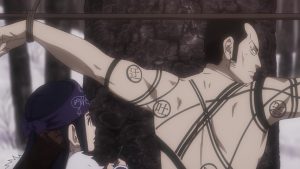 What’s happening, in part, is Noda Satoru doubling down on all the things he does very well. We have so many incredible characters whose orbits rarely intersect, and that gives him awesome storytelling flexibility. But what Noda does that few others can match is introduce new characters for a chapter or two and have them stand out as exceptional. Youichirou, now known as Shinzoi Doi, is a perfect example. Hitokiri Youichirou is played by 85 year-old Kiyokawa Motomu, and he spotlights Noda-sensei’s uncanny ability to make you wish a one-off character was the star of their own series.
What’s happening, in part, is Noda Satoru doubling down on all the things he does very well. We have so many incredible characters whose orbits rarely intersect, and that gives him awesome storytelling flexibility. But what Noda does that few others can match is introduce new characters for a chapter or two and have them stand out as exceptional. Youichirou, now known as Shinzoi Doi, is a perfect example. Hitokiri Youichirou is played by 85 year-old Kiyokawa Motomu, and he spotlights Noda-sensei’s uncanny ability to make you wish a one-off character was the star of their own series.
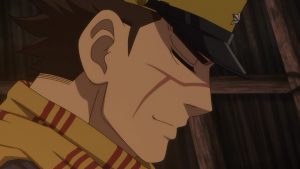 Youichirou is nominally of interest to Hijikata and his group because he bears one of the Wilk’s tattoos. But these two have a history – a deep and intense one, as Youichirou was a manslayer in the service of the Imperial loyalists (the Shinsengumi’s sworn enemies). It’s not only Hijikata who’s interested – two separate groups of revenge-seekers are after him too, having hired guards from Abashiri to accompany them and identify Youichirou at the end of the trail. It’s a bit of a credulity stretch that they should all arrive at the same time, but that’s a tiny quibble – and you can’t deny it makes for great drama.
Youichirou is nominally of interest to Hijikata and his group because he bears one of the Wilk’s tattoos. But these two have a history – a deep and intense one, as Youichirou was a manslayer in the service of the Imperial loyalists (the Shinsengumi’s sworn enemies). It’s not only Hijikata who’s interested – two separate groups of revenge-seekers are after him too, having hired guards from Abashiri to accompany them and identify Youichirou at the end of the trail. It’s a bit of a credulity stretch that they should all arrive at the same time, but that’s a tiny quibble – and you can’t deny it makes for great drama.
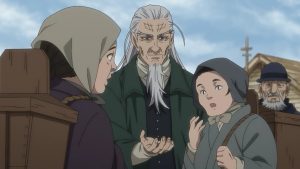 “Hitoriki” is, as much as anything, a musing on the end of life. Youichirou is old and seemingly feeble, working at a fish camp but unable to do much real work. The less kindly of his fellows disdain and harass him, though one kindly soul takes it on himself to watch out for him. The Manslayer, it seems, fled to Nemuro. There he married an Ainu woman and changed his name. He lived peacefully for 20 years until a relative of one of his victims kidnapped his wife, forcing “Shinzou” to kill him and go to prison. Having escaped to be with his dying wife, he now lives out his days in regret over the lives he’s taken, his mind ever-wavering between the present and the inglorious days of his youth.
“Hitoriki” is, as much as anything, a musing on the end of life. Youichirou is old and seemingly feeble, working at a fish camp but unable to do much real work. The less kindly of his fellows disdain and harass him, though one kindly soul takes it on himself to watch out for him. The Manslayer, it seems, fled to Nemuro. There he married an Ainu woman and changed his name. He lived peacefully for 20 years until a relative of one of his victims kidnapped his wife, forcing “Shinzou” to kill him and go to prison. Having escaped to be with his dying wife, he now lives out his days in regret over the lives he’s taken, his mind ever-wavering between the present and the inglorious days of his youth.
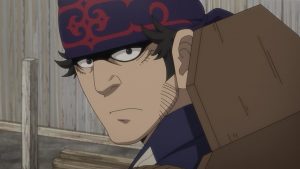 The violent turn this episode takes is rather shocking, but it’s not remotely out of character for Golden Kamuy. This series is the master of tonal shifts, with as wide a range as any anime out there. A manslayer once is a manslayer always, and when cornered this one shows his teeth are still razor-sharp. Youichirou may be more than ready to die, but he still intends to die on his own terms. And this, ironically, is something his old enemy can offer him. Hijikata is Youichirou’s savior as much as his killer.
The violent turn this episode takes is rather shocking, but it’s not remotely out of character for Golden Kamuy. This series is the master of tonal shifts, with as wide a range as any anime out there. A manslayer once is a manslayer always, and when cornered this one shows his teeth are still razor-sharp. Youichirou may be more than ready to die, but he still intends to die on his own terms. And this, ironically, is something his old enemy can offer him. Hijikata is Youichirou’s savior as much as his killer.
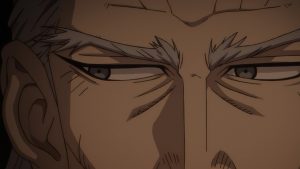 Hijikata shows great respect for his mortal enemy here – even admitting that the ideals of the Imperialists might have been right all along. He gives the hitokiri what he wants, a death by the sword – but Youichirou declines an easy dispatch on the grounds that he’s unworthy of it. The sense of confusion and grief the old man is suffering though is depicted brilliantly here (Suerhiro Kenichirou’s music is once again integral). And so is the discomfort this forces on Hijikata. The old lion isn’t much younger than Youichirou, yet he struggles onwards with a new purpose. Being reminded of how long he’s been a relic surely can’t be pleasant for him.
Hijikata shows great respect for his mortal enemy here – even admitting that the ideals of the Imperialists might have been right all along. He gives the hitokiri what he wants, a death by the sword – but Youichirou declines an easy dispatch on the grounds that he’s unworthy of it. The sense of confusion and grief the old man is suffering though is depicted brilliantly here (Suerhiro Kenichirou’s music is once again integral). And so is the discomfort this forces on Hijikata. The old lion isn’t much younger than Youichirou, yet he struggles onwards with a new purpose. Being reminded of how long he’s been a relic surely can’t be pleasant for him.
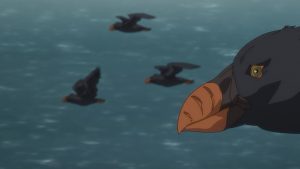 The two other major poles of the quest for the gold appear only briefly this time, on either end of the episode. Sugimoto declares that he’s figured out a secret about the code of the tattoos, though he declines to share it with Koito. And Asirpa’s group proceeds deeper into Russia, where Kiroranke declares that rather than simply free Sofia, he intends to free all 250 prisoners at Ako, thus making it difficult for Sofia to be tracked. To do this he’ll steal the explosives from a local lighthouse and blow the prison walls. He still thinks like a revolutionary – which gives Kiroranke something in common with both Hijikata and Tsurumi. As for Ogata, he finally admits Asirpa’s cooking is hinna – though don’t expect him to do so on command…
The two other major poles of the quest for the gold appear only briefly this time, on either end of the episode. Sugimoto declares that he’s figured out a secret about the code of the tattoos, though he declines to share it with Koito. And Asirpa’s group proceeds deeper into Russia, where Kiroranke declares that rather than simply free Sofia, he intends to free all 250 prisoners at Ako, thus making it difficult for Sofia to be tracked. To do this he’ll steal the explosives from a local lighthouse and blow the prison walls. He still thinks like a revolutionary – which gives Kiroranke something in common with both Hijikata and Tsurumi. As for Ogata, he finally admits Asirpa’s cooking is hinna – though don’t expect him to do so on command…


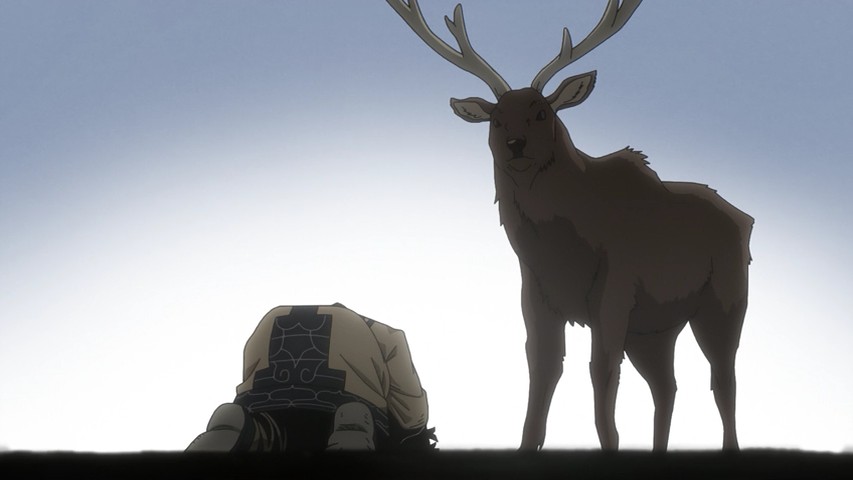
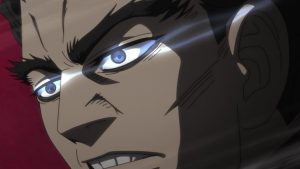
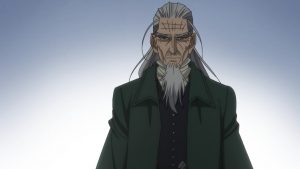

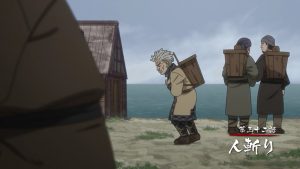
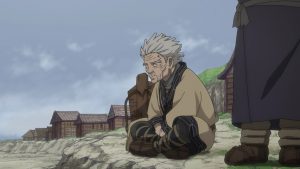

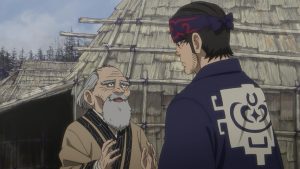
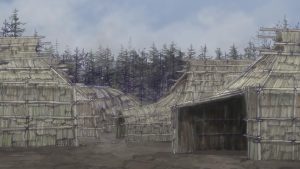
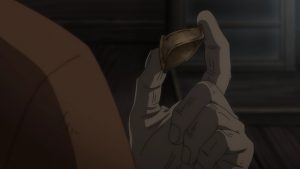
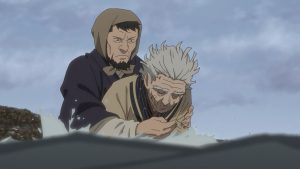



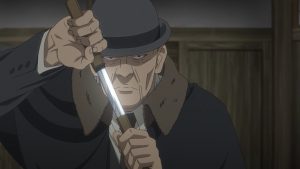
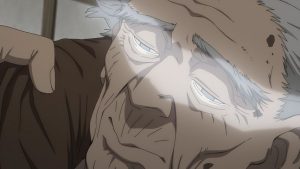
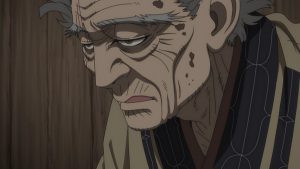

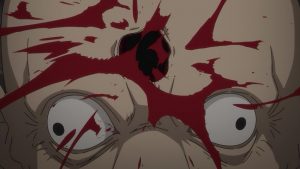
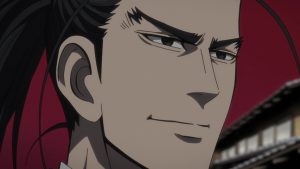
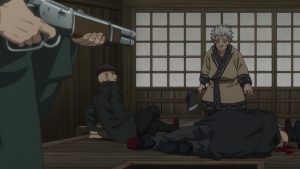

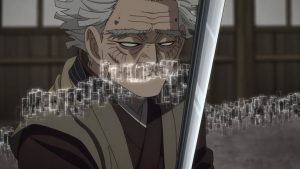
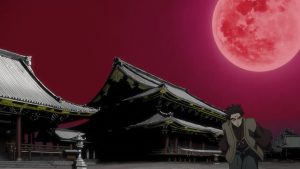

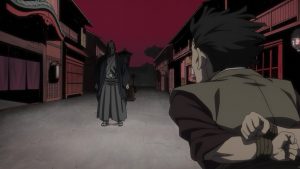
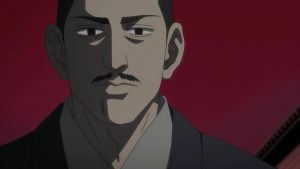

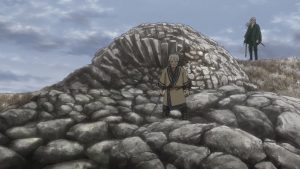

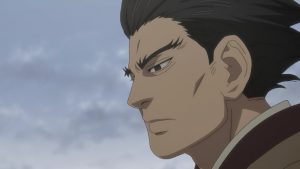
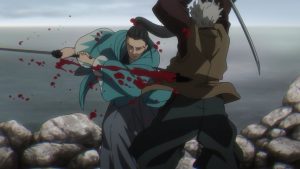

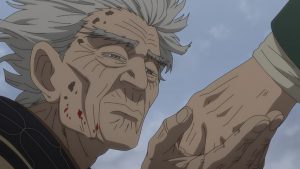
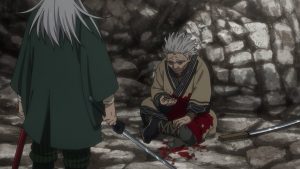


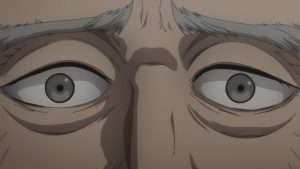
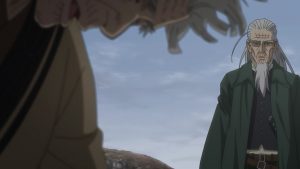

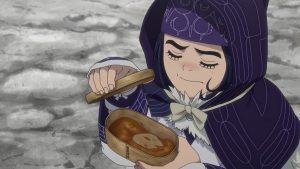
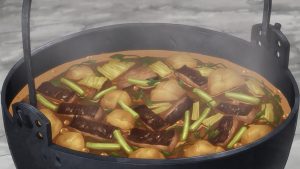
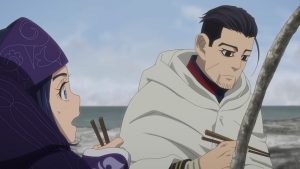

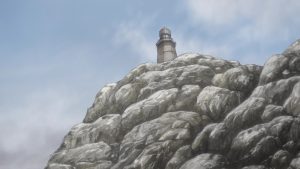
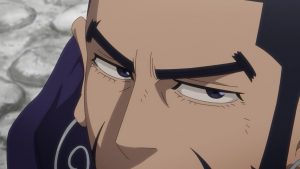

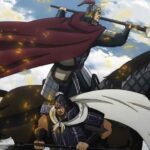
bennydelon
November 25, 2020 at 7:05 amHijikata’s group is my less favorite, but this episode was really good.
I always found it interesting how fast Japan modernized, to the point that they can set this story in 1907, with a clear early 20th century “feel” to it, and yet have old characters remembering their days as samurai.
Guardian Enzo
November 25, 2020 at 10:47 amNoda is a master at that sort of epic story framing. But even so, I’m not sure it would be that different if the story were set in America in 1907, where you could have older characters who were veterans of the wild west gunslinger days, pre Transcontinental Railroad.
Red
November 25, 2020 at 7:49 amChanbara episode with some guns and wrestling! nice. My only question mark is that deer, was that supposed to be Hijikata? I don’t see a connection…
Guardian Enzo
November 25, 2020 at 10:43 amAs Freud said, sometimes a reindeer is just a reindeer.